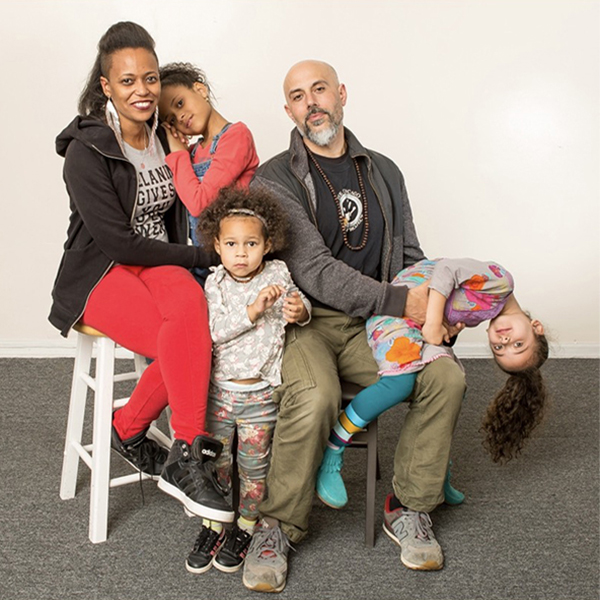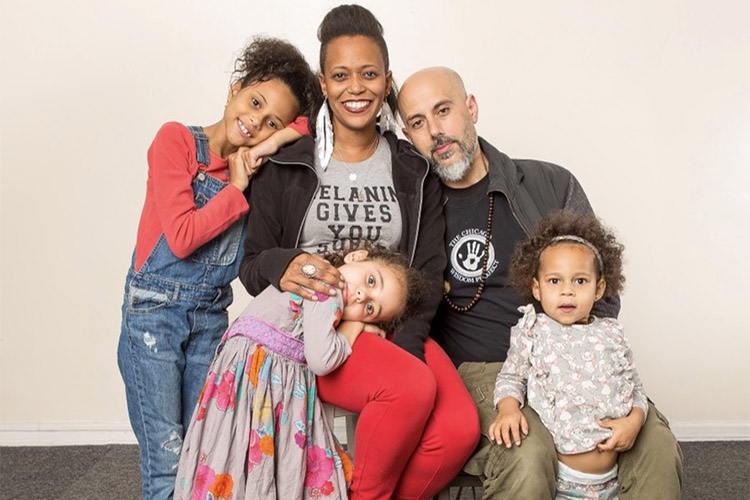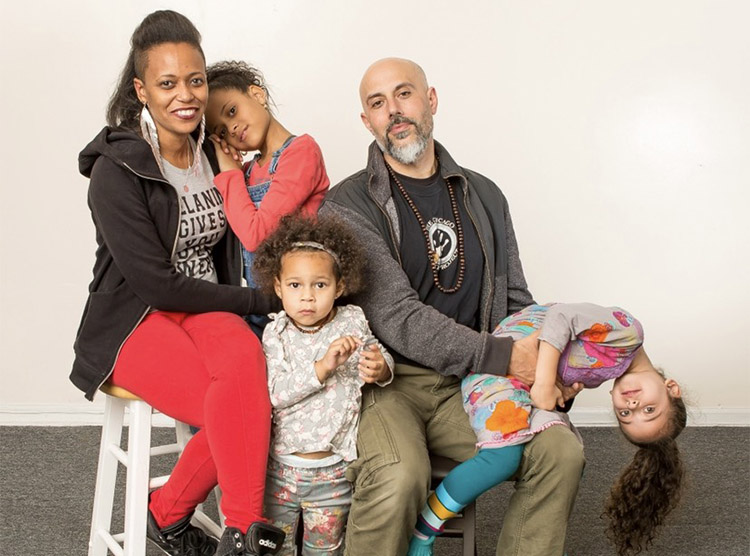Arianne:
I’m Arianne Richards
Theodore:
I’m Theodore Richards
Arianne:
And Cosima Richards who is 12, Calliope Richards who is six soon to be seven, and Vismaya Richards who is five, all girls.
You know how Chicago winters are. They're just bleak and dark every day. And our kids weren't going outside. Well, we got to a point we were making them go outside, even if it was just for a few minutes.
Theodore:
Not as long though as we would have liked. Yeah, yeah, yeah.
Arianne:
But we figured out our groove. I started having my niece to come with the kids for four hours every day in the afternoon. Because we were giving each other breaks, so two hours each a day. But it still wasn't enough to get done what we needed to get done. And Cosima at her being 12, she's pretty self sufficient. But the other two.
Theodore:
They're five and six for the record.
Arianne:
They're constant. So we hired my niece and now she's with them for four hours a day and it's made a huge difference. And during this time, Cosima got accepted into the Academic Center at Kenwood. So we pulled all of our kids from the school that they were in.
Theodore:
Private school.
Arianne:
Private school. And yeah. I got to say, that was a change that we weren't expecting.
Theodore:
We're homeschooling the two little ones for the rest. For the whole next year.
Arianne:
Which is a little frightening, but we can do it. I'm always like I don't understand people who choose this.
Theodore:
If I would have said ... You may edit this out, but if I would said, this is between us, Toni, if I would have said seven or eight months ago, "Hey, Ari, I think we should homeschool the kids." She would have probably-
Arianne:
Packed up and left.
Theodore:
Well, damn!
Arianne:
I'm joking!
Theodore:
Yeah, yeah, she would not have responded positively. Let me just put it like that. Yeah. So it's surprising. And the other hard part too like we're in the middle of a pandemic and our kids are at home and that's a lot. And then at the end of May when all of the unrest was happening ... So we're homeschooling our children and it's like people running past the house with bags of stuff and it's helicopters circling and it's stressful. It's like really stressful. And it's like-
Arianne:
Loud bangs. It's just constant fireworks or gun shots.
Theodore:
Smoke wafting through the yard. So it was like a lot of stress. I mean on the other side, we're lucky that we're able to have somewhat flexible schedules to give our kids the attention they need. And honestly, they're not really bothered by any of this stuff. They're fine. They're like “Whatever. Okay.”
Arianne:
I think Cosima, it's hardest for her because of socialization.
Theodore:
She's in middle school.
Arianne:
It's everything. And we were concerned about her transferring schools in the middle of a pandemic. But the reality is all of these kids are coming in new. All of them are new seventh graders so they're all in the same boat.
Theodore:
I would describe it a little differently from the way you described it. When the first, in the beginning of the pandemic, I was ... How can I describe myself?
Arianne:
Very optimistic?
Theodore:
I was optimistic and I was super dad. I was going to ... I had a schedule. I was doing it. I was doing it. And I have everything ... Like I had a whole schedule for the day and the kids were ... I was doing it. I had everything together, right? But I think the thing that was not happening was I think we learned, I learned. I learned that it's equally important that everyone, including the parents, feel happy and appreciated and listened to the whole time. You know what I mean? And if any of the parents or kids is feeling like this is too stressful or too much, like the curriculum or whatever you're doing for homeschooling is not as important. You know what I mean? So I think we found a better balance in time.
Arianne:
Yes. And I remember when we figured that out. We were like, "What took us so long to do this?"
Theodore:
Sometimes for example, like sometimes it's really okay ... Not just okay, but it's actually ... What needs to happen is like maybe instead of working on your reading on a given morning with like our six year old, maybe what she needs is for mommy to do her hair that morning. You know what I'm saying? Like maybe that's just what's needed for her, probably for mommy more than the kids.
Arianne:
Just bonding. Just caring for each other. Just basic things where you're just caring for each other.
Theodore:
I think when you separate family from school, it's very easy to think of an education as something that is just about the skills that they gain or the knowledge that they have or those kinds of academic things. And I think what was clear with homeschooling was like they're home all ... We have all day and if they do a little bit ... Like we don't need to do eight hours of academics with them. If we can do a little bit of one on one with them each day and they'll get a lot of that. Just working with us one on one. So how do we feel the rest ... What are we doing the rest of the day? And there are just so many things. And all those things to me most of the rest of the day had to do with learning how to just be with each other as a family. Which doesn't seem like something that you have to learn, but actually, it's probably the most important thing that you can learn.
Like I wish someone would have taught me that when I was a child. You know what I mean? And not taught like in a formal way, but taught through the experience of like just being together and learning how to take care of each other. It's very clear that we have to take care of each other. And that it's the responsibility of each person in the family to take care of each other. That's really important. Because I think sometimes in school, you're taught most of the day that it's your job to worry about yourself, your grades, your this, your that, rather than think about your role in a community and taking care of each other. So to me, that's the most important thing that we can teach our children. Like how to love and how to be loved.
Arianne:
Stability and love. I mean, stability is broad. Stability of where you go to school. Stability of knowing that you've got somewhere to lay your head at night. Knowing that you're going to get a meal. The stability in knowing that your family loves you. That we are going to have your back. So I think, for me, and the feeling of feeling safe. There were times in my childhood where I didn't feel safe, even at school. And I know that they feel safe. So actually, it's probably them feeling safe more than it is stability now that I'm saying it. But it's important. I'm happy and I love that they feel safe.



